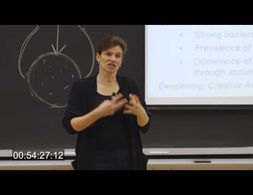3 Ergebnisse
Carsten Dreher starts with a historical perspective on the development of evolutionary economics by mentioning the difficulties of neoclassical economics to explain economic growth and by referring to the work of Joseph Schumpeter. Then some concepts such as business cycles, path dependencies are shortly explained. Dreher continues by introducing two different approaches in evolutionary economics, a micro centred approach that is associated with Nelson and Winter's work and a macro institutional and historical approach that has been pursued amongst others by Chris Freeman. Lastly the policy implications of treating economies as innovation systems are discussed and a summary of the differences of neoclassical and evolutionary economics is provided.
What is innovation, what drives innovation and the process that differentiates firms? What is competition and what kind of dynamics lie behind the differences between firms and their innovative activities? Mariana Mazzucato elaborates on those questions from an evolutionary economics' and Schumpeterian perspective. The slides of her lecture are not visible, hence some visualizations can't be followed.
[Schumpeters Begriff der "Schöpferischen Zerstörung" ist spätestens durch die Innovationen im Silicon Valley in aller Munde. Aber was hat es damit genau auf sich? Und wie kann Schumpeters Begriff für eine Gesellschaftstheorie über rein ökonomische Phänomene fruchtbar gemacht werden?, eingefügt von J.S.]
Wir nutzen Cookies. Klicke auf "Akzeptieren" um uns dabei zu helfen, Exploring Economics immer besser zu machen!



